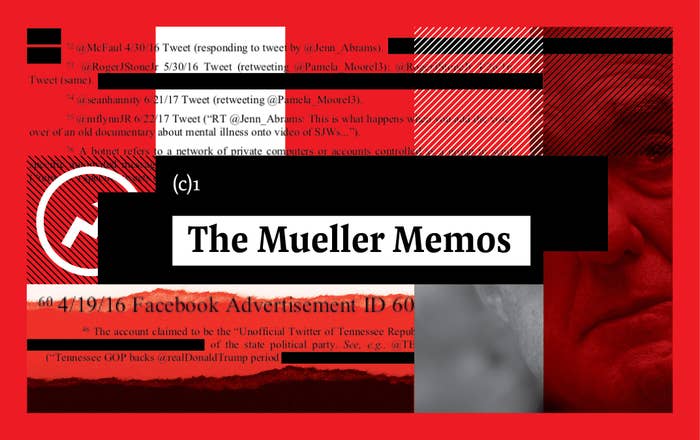
The tumultuous early days of Michael Flynn’s brief tenure as President Donald Trump’s national security adviser are laid bare in more than 100 pages of FBI interview summaries that reveal new details about his secret conversations with Russia’s ambassador weeks before Trump was inaugurated.
He didn’t last long because he couldn’t seem to tell members of the new administration a straight story.
“Did you lie to Pence?” Trump asked Flynn on Feb. 12, 2017, when he was confronted about his contacts with Sergey Kislyak, then Russia’s ambassador to the US.
“No, I just didn’t remember the full conversation,” Flynn said.
“Okay. That’s fine. I got it,” Trump said.
The next day Flynn was fired.

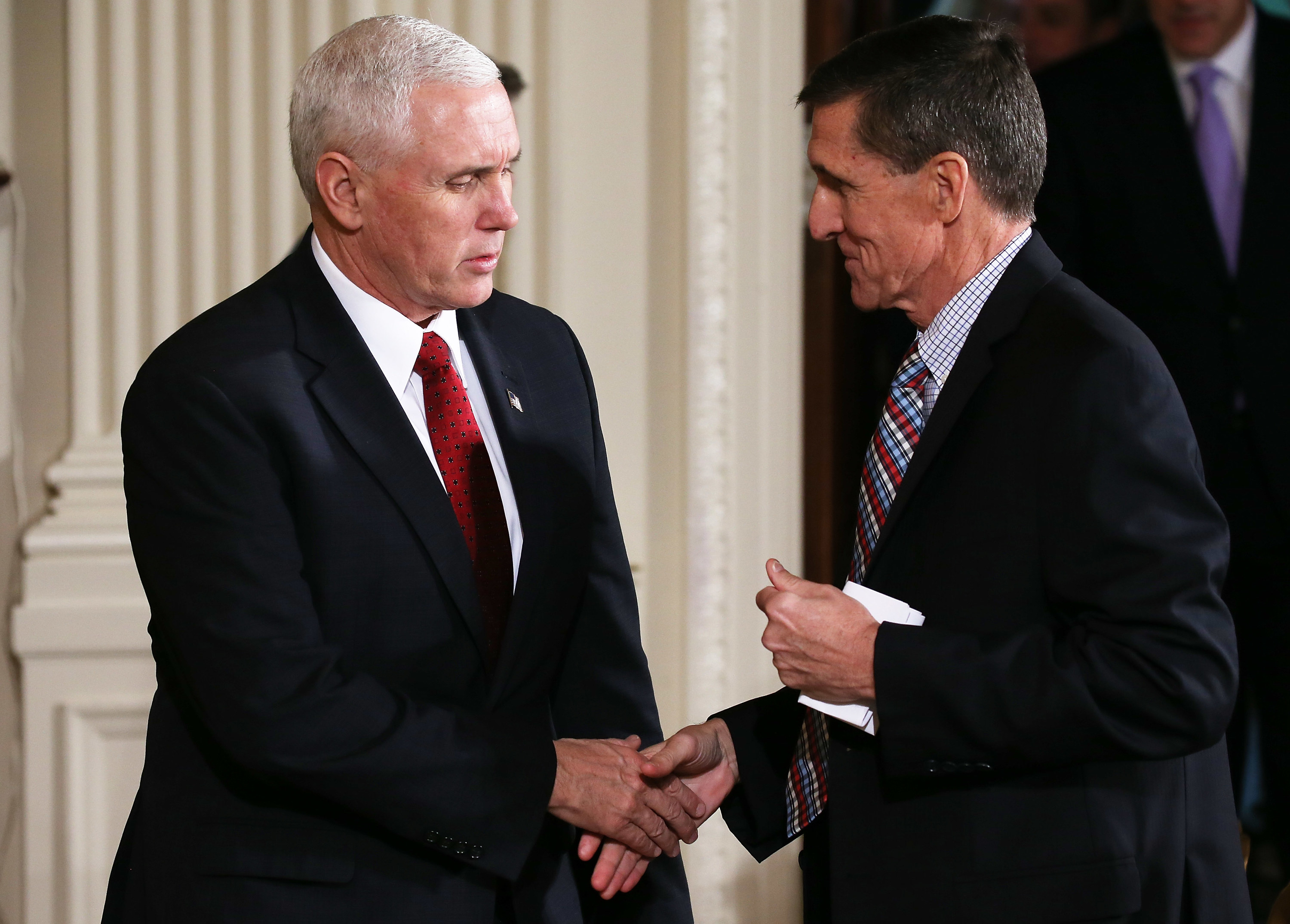
And so began Flynn’s legal journey, which lasted nearly as long as Trump’s presidency. It saw Flynn twice plead guilty to lying to the FBI, cooperating with former special counsel Robert Mueller’s investigation into Russian interference in the 2016 election, fighting for exoneration, his charges being dropped by the government, and, last November, receiving a full pardon from his former boss who repeatedly referred to the probe as a “witch hunt.”
The 126 pages of FBI documents the Justice Department released Friday, known as 302s, were released to BuzzFeed News and CNN in response to a Freedom of Information Act lawsuit for summaries of witness interviews from Mueller’s investigation. The government had previously withheld the records because Flynn’s criminal case was still ongoing. But after he was pardoned, the news organizations pressed the department to reprocess the records and release them. Some of the details continue to be withheld because of ongoing investigations.

The 14 interview summaries cover a wide range of topics over the course of a year — from November 2017 through September 2018, a portion of which predated Mueller’s appointment. In many instances, Flynn told FBI agents and investigators he could not recall conversations he had had with administration and campaign officials about his foreign travel, meetings with Turkish officials, or being contacted by WikiLeaks, despite being presented with evidence about the discussions he took part in.

Kislyak, the former Russian ambassador, was a key figure in the Russia investigation. Former attorney general Jeff Sessions had conversations with him that he failed to disclose during his confirmation hearing, which forced Sessions to recuse himself from the probe. Jared Kushner, the president’s son-in-law and adviser, discussed with Kislyak setting up a backchannel line of communication at the Russian Embassy. But it was Flynn’s December 2016 and January 2017 discussions with Kislyak, which he would eventually admit to investigators he was "ashamed" of, that received far more scrutiny because of the nature of the topic.
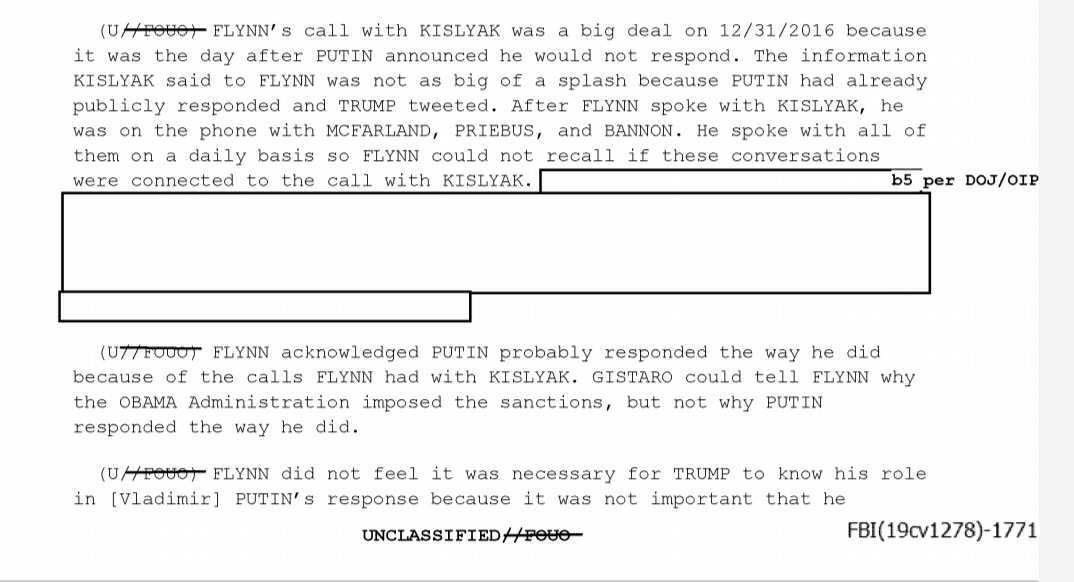
“Flynn knew he got involved in U.S. policy when he called Kislyak,” the interview summary says. The nature of his Dec. 29, 2016, call went beyond his powers prior to officially taking office.
The interview summary goes on to say that Flynn discussed sanctions with Kislyak and advised him that “Russia should not get into a ‘tit for tat … where we are a couple of weeks away from going into the White House.’”
The Obama administration had imposed sanctions on Russia that month for interfering in the 2016 presidential election.
When the two spoke again, on Dec. 31, “Kislyak said to Flynn, ‘Message received,’ that he should have seen that [Vladimir] Putin said he would not respond in kind.”
Flynn interpreted Kislyak’s response to mean Putin was not going to “retaliate,” he told the FBI during an interview in November 2017.
Flynn’s call with Kislyak on Dec. 31, 2016, was a “big deal,” the interview summary says, “because it was the day after Putin announced he would not respond.”
“Flynn acknowledged Putin probably responded the way he did because of the calls Flynn had with Kislyak."
When the FBI and investigators asked Flynn if he disclosed the substance of his call with Kislyak to Trump, the FBI interview summary says, Flynn “did not think he had a conversation with Trump.”
“Flynn was not proud, but saw what he did as a function of what he was asked to do as National Security adviser,” the interview summary says.
The interview summaries go on to state that Flynn was “embarrassed” about his calls with Kislyak when he was “questioned about the topic” by former White House chief of staff Reince Priebus.
After stories were published about Flynn and what had at the time been allegations that he had had discussions with Kislyak about sanctions, Flynn attended a transition team meeting where the focus was on him. He was told by Priebus to speak with Sean Spicer, the former White House press secretary, “so he would know what Flynn knew.” But Flynn lied to Spicer and “did not mention to Spicer he spoke about sanctions with Kislyak because of his embarrassment.”
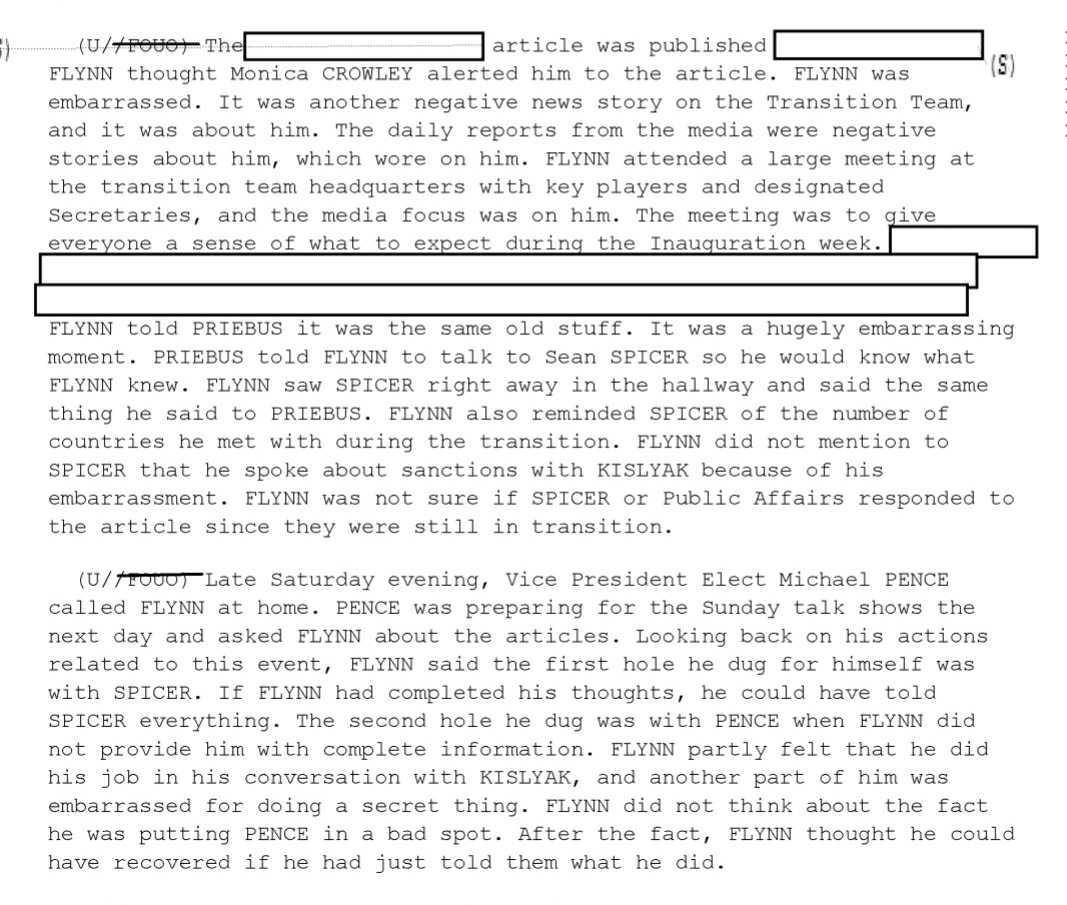
When Flynn received a call at home from Vice President-elect Mike Pence on a Saturday evening in January 2017 in advance of Pence’s appearance on the Sunday morning news shows, he asked Flynn about news stories that had reported about his conversations with Kislyak during the transition. But Flynn lied because he “was trying to protect himself.”

“Looking back on his actions related to this event, Flynn said the first hole he dug for himself was with Spicer,” the interview summary says. “If Flynn had completed his thoughts, he could have told Spicer everything. The second hole he dug was with Pence when Flynn did not provide him with complete information. Flynn partly felt that he did his job in his conversation with Kislyak, and another part of him was embarrassed for doing a secret thing.”
Flynn's attorney, Sidney Powell, did not respond to requests for comment.
Flynn was also one of a handful of Trump officials who took part in a 20-minute phone call between Trump and Putin after the 2016 election.
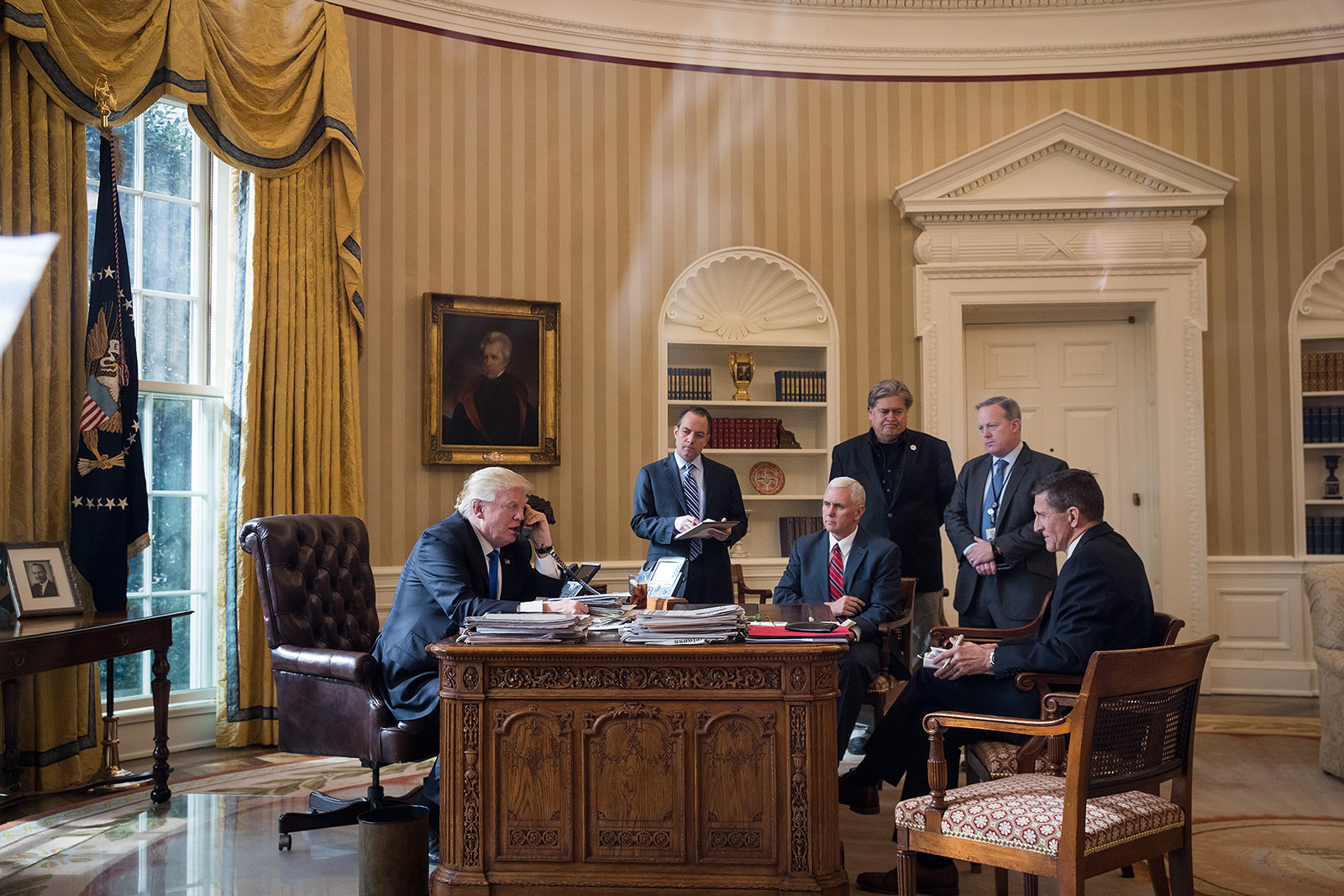
“Flynn described the call as strong and positive,” the interview summary says. “Trump assured Putin ‘our guys will be talking to you.’”
Flynn, who in 2016 had led Trump rallies in chants of “lock her up,” was also questioned extensively about Hillary Clinton’s 33,000 deleted emails. Trump tasked him with finding the emails. Flynn, who in early interviews with Mueller's team denied he played a role in the Trump campaign's effort to find the emails, later said he had reached out to his contacts in Russia.

According to the FBI interview summary, Flynn heard that a server in Ukraine might have held the emails, “and Benghazi,” which turned out to be a conspiracy theory that Trump mentioned in a phone call with Ukraine’s president that was at the center of the first impeachment proceedings in 2019.
The interview summaries also show that Flynn had reached out to a former Bill and Hillary Clinton confidante, Sidney Blumenthal, for help in finding the emails.
Other portions of the interview summaries show that Flynn was questioned about a $10 million check Trump wrote to his 2016 campaign and what Flynn knew about the source of the funds, former Blackwater founder Erik Prince's relationship to the campaign, and efforts to discredit Mueller's probe by conservative journalists and a Senate staffer.
Flynn, who according to the interview summaries was one of “four finalists considered” to be Trump’s vice presidential pick, told the FBI that, in retrospect, he “wanted to kick himself for saying yes to the offer” to be Trump’s national security adviser. ●
